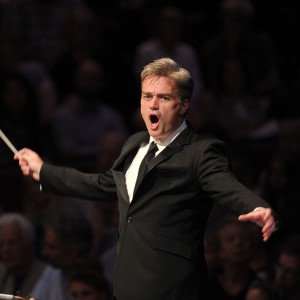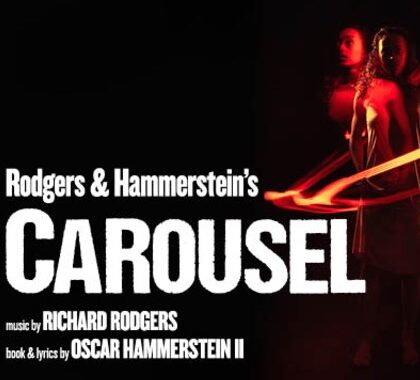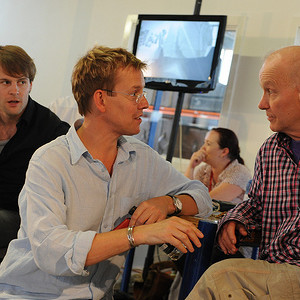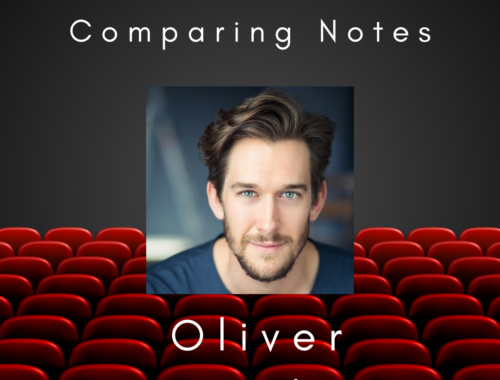Prom 43: BBC Symphony Orchestra, Skride, Gardner, Royal Albert Hall
 The Russians were coming – and the prospect of Tchaikovsky’s 1812 Overture, even without the added attraction of hearing it in Igor Buketoff’s questionable choral arrangement where the Tsarist hymn is taken at its word and does a Boris Godunov on us, the promenade queues were fast stretching towards South Kensington. And if ever music replicated the excited buzz of something in the air Stravinsky’s Scherzo fantastique did, raising the curtain almost imperceptively through the scurrying of muted strings and surprised woodwind punctuations. Here is music that redefines the idea of airborne until, that is, its ravishing trio confirms what we thought all along – that its magical measures would seem to have escaped the enchantment of the composer’s Firebird. Edward Gardner and the BBC Symphony Orchestra played it with a winning deftness, keeping it on the breath, off the string, as if it might simply evaporate at any moment.
The Russians were coming – and the prospect of Tchaikovsky’s 1812 Overture, even without the added attraction of hearing it in Igor Buketoff’s questionable choral arrangement where the Tsarist hymn is taken at its word and does a Boris Godunov on us, the promenade queues were fast stretching towards South Kensington. And if ever music replicated the excited buzz of something in the air Stravinsky’s Scherzo fantastique did, raising the curtain almost imperceptively through the scurrying of muted strings and surprised woodwind punctuations. Here is music that redefines the idea of airborne until, that is, its ravishing trio confirms what we thought all along – that its magical measures would seem to have escaped the enchantment of the composer’s Firebird. Edward Gardner and the BBC Symphony Orchestra played it with a winning deftness, keeping it on the breath, off the string, as if it might simply evaporate at any moment.
And then, just as magically, the distant sound of sleigh-bells drew ever closer until the combined BBC Symphony Chorus and Crouch End Festival Chorus roared their affirmation and Rachmaninov’s Choral Symphony The Bells was pulled into focus for one of the undoubted highlights of this Proms season. Each time one hears this astonishingly evocative piece the extraordinary kinship between its composer’s unquenchable melancholy and the darkest undercurrents of Edgar Allan Poe’s poetry seems ever more penetrating. It certainly seemed so in this wonderfully searching and subtly coloured account from Gardner and his sizable forces. It helped that he had three pitch-perfect soloists in Stuart Skelton, Albina Shagimuratova, and Mikhail Petrenko, Skelton easing us into that marvelous quasi-liturgical humming chorus at the heart of the opening setting where Poe writes of “the delight of tender sleep”, Shagimuratova plangently mingling rapture with disquiet in the Mellow Wedding Bells movement, and Petrenko, Hagen-like and chilling as the grave in the valedictory finale where Rachmaninov finds one of those unutterably heart-easing phrases finally to grant us and himself benediction. In between, Gardner’s huge but incisive chorus spat their onomatopoeic fire through the clamour of Loud Alarum Bells. It was, in a word, terrific.
As was the amazing Baiba Skride in a piece that she is fast claiming as her own – Stravinsky’s Violin Concerto. She has probably the best recording of it around at the current time and no one addresses its quirkily inventive and highly capricious nature quite like she does. The way in which she finds such musical solutions to the first movement’s devilish voltes-faces flipping from gorgeous legato to clownish parody in a heartbeat is remarkable; so, too, the exquisite Bach-like refractions of the two Arias where embellishment feels so in the moment as to properly invoke the improvisatory nature of the work’s true inspiration.
But from 20th century Baroque to 19th century heroics, though, of course, the classicist in Tchaikovsky could not resist a fugue in the gathering storm of his 1812 Overture. Tchaikovsky purists will always find it hard to defend Igor Buketoff’s 1960s all-singing Hollywood take on the composer’s most popular blockbuster: Tchaikovsky was very particular about avoiding the obvious in the hushed opening pages preferring to suggest the sound of an a capella chorus rather than quite literally presenting it. But if you’ve got a spare couple of hundred voices in the Albert Hall why not flaunt them? This may not have been the best performance of the evening (a few ragged edges here and there) but it was the loudest. And when all is said and done it wasn’t Gardner’s lovely vocal phrasing of the lyric second theme that people had packed into the hall to hear but the extra brass band, the panoply of tubular bells from stage and gallery, and the deafening cannon reports making excited kids of us all once more.


